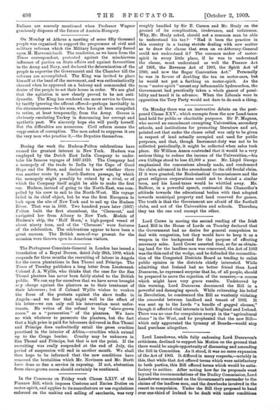The Portuguese Consulate-General in London has issued a translation of
a Royal Decree, dated July 29th, 1909, which suspends for three months the recruiting of labour in Angola for the cocoa plantations in San Thome and Principe. The Times of Tuesday publishes a long letter from Lieutenant- Colonel J. A. Wyllie, who thinks that the case for the San Thome planters has never been fairly stated to the British public. We can say for ourselves that we have never brought ar y charge against the planters as to their treatment of their labourers ; but if Colonel Wyllie wishes to weaken the force of the protests against the slave traffic in Angola—and we fear that might well be the effect of his letter—we can only call his intervention most unfor- tunate. He writes of the refusal to buy "slave-grown cocoa" as a " persecution " of the planters. We have no wish whatever to persecute the planters, but the fact that a high price is paid for labourers delivered in San Thome and Principe does undoubtedly entail the gross cruelties practised in the interior of Africa,—cruelties which extend up to the Congo border. Cruelty may be unknown in San Thome and Principe, but that is not the point. If the recruiting was really suspended at the end of July, the period of suspension will end in another month. We shall then hope to be informed that the new conditions have removed the brutalities which Mr. Nevinson and Mr. Burtt Lave done so fine a service in exposing. If not, abstention from slave-grown cocoa should certainly be continued.


























































 Previous page
Previous page